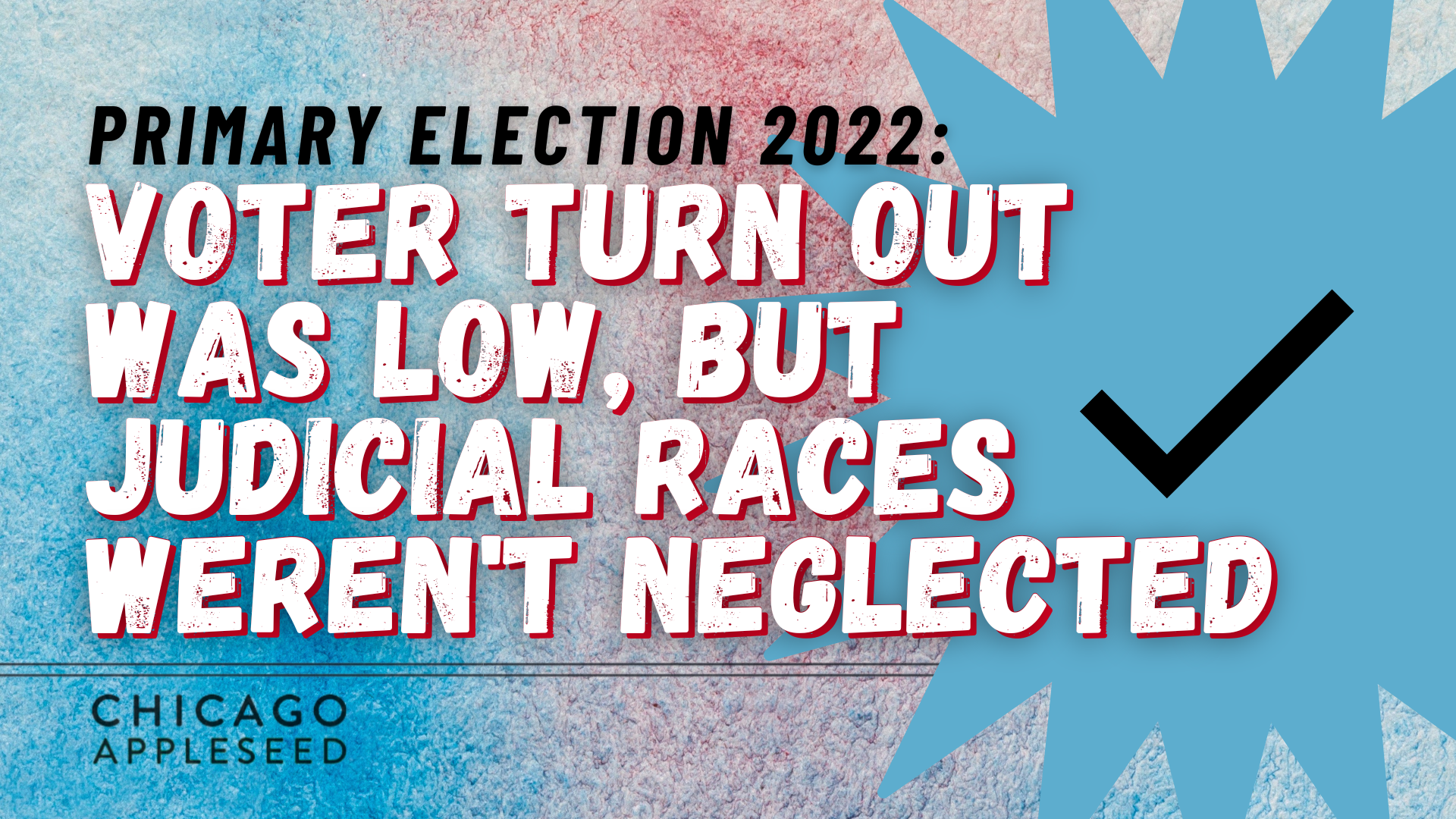Primary Election Results: Voter Turnout was Low, but Judicial Races Weren’t Neglected
Preliminary results are in from the 2022 primary election in Illinois, which included a number of judicial races. Primary turn-out was disappointing – the “second-lowest for a modern-era primary” – with only 1-in-5 Chicago voters participating and suburban Cook County showing a similar turn-out rate and DuPage County slightly higher at 22%.
While the turnout was indeed low, those who did vote did not neglect the judicial races: the ballot drop off for the twelve countywide judicial contests was only 16%, which is the lowest it has ever been.
Because many people vote a party ticket in the general elections, and because the City of Chicago trends toward Democratic victories in general elections, the primary races are where many decisions are made – even in Judicial races. In Illinois, judges run for the first time in a partisan election, and subsequently seek re-election (called “retention” for judicial offices) in non-partisan elections every six years thereafter. Ohio. Pennsylvania, North Carolina. Alabama, Louisiana, and Texas also elect judges in partisan elections. In the primary, the judicial election functions like all elections: the candidate with the most votes wins and appears on the ballot in the general election, where, again, the candidate to receive the most votes wins. In a retention election, a judicial candidate runs unopposed and voters are asked to vote “yes” or “no” on the question of if that judge should be retained; a judge who receives 60% yes votes retains their seat. The next retention election will take place on November 8.
It cannot be overstated how critical judicial selection is to the fair and just governance of a state. However, specific rules of conduct for judicial candidates limit what candidates can say about justice-related issues, making it difficult for voters to determine whether a judicial candidate meets their expectations for a good judge or reflects their values. It is difficult, too, for some voters who have limited experience in courts to form expectations about what makes a good judge. Although any of us can end up in court—for a divorce, a landlord dispute, a lawsuit following a traffic collision—it remains a rare experience for most people, leaving voters with few reference points for choosing among judicial candidates.
Chicago Appleseed Center for Fair Courts created VoteForJudges.org more than a decade ago in an effort to educate voters about Cook County judicial elections.
Today, Chicago Appleseed administers the website, which is sponsored by the Committee to Elect Qualified Judges, a political action committee dedicated to informed judicial voting. VoteForJudges aggregates the Alliance of Bar Association evaluations (including the Illinois State Bar Association and the Chicago Council of Lawyers), the Chicago Bar Association, media coverage, and resources from local organizations in one central location. It offers sample ballots and election information generally. While most bar associations offer only a qualified/not qualified (or recommended/not recommended) rating, ISBA and CCL offer a narrative evaluation to round out their ratings.. The resource is available for voters and journalists alike; information at VoteForJudges is incorporated into guides from groups such as Chicago Votes, Ballot Ready, and Injustice Watch.
Organizations focus on different metrics when evaluating judges for office. Bar associations tend to focus on education, experience, and professional reputation, interviewing both the candidates and their colleagues. Other guides may focus on community reputation and news reporting about the candidate. Their focus on the community’s interest in justice—and the community’s conception of justice—are critical for ensuring public trust in the judiciary. The legitimacy of courts depends not only on public trust, but also on participation in the selection of judges. The list of judicial candidates in any election is usually quite long but there are good resources available to help make informed choices.
Judges matter and informed voters matter.
Although Chicago’s biggest newspapers, the Chicago Tribune and the Chicago Sun-Times both “completely ignored the judicial part of the ballot, providing no endorsements of their own and not even reporting bar association ratings” for the first time in at least half a century, according to an analysis by Dr. Albert Klumpp, the biggest influence on primary judicial elections this year were the evaluations of bar associations. Almost all candidates who held or shared higher ratings from the Alliance of Bar Associations and the Chicago Bar Association than their opponents “gained an advantage of a whopping 29 percentage points.”
Chicago Appleseed Center for Fair Courts works to create an accessible way for voters to engage in the meaningful evaluation process with VoteForJudges, which works to help voters make informed decisions in judicial elections. Vote for qualified judges—it makes a difference.

